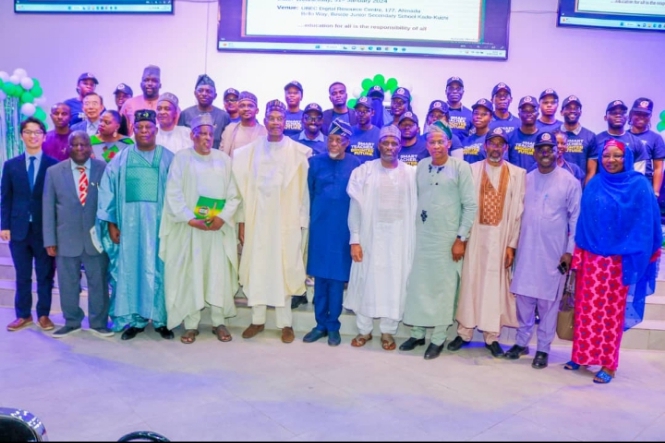The Federal Government has launched a new teacher development programme, Teacher Internship Scheme (TIS), designed to support States in the emergence of a new generation of teachers with skills and knowledge needed to excel in the digital age and help in the implementation of smart education in Nigeria.
The scheme was introduced by Universal Basic Education Commission (UBEC), to address the dearth of teachers in the field of smart education being championed by the Commission in Nigeria, with the establishment of 37 Smart Schools across the country.
Also Read Nigeria, Bulgaria To Deepen Bilateral Ties In Education
The execution of smart education programme of Nigeria is being provided technical support by the Korea International Cooperation Agency (KOICA), and commitment of about $10.4 million to the project.
Minister of Education, Professor Tahir Mamman, flagged off the teacher Internship scheme at the UBEC Digital Resource Centre, located at Kado, Abuja, where he also inspected the facility established to serve as a hub for creating and distributing resources to schools as well as training the school personnel.
He expressed the commitment of the Federal Government towards provision of Information and Communication Technology (ICT) infrastructure for enhanced teaching and learning in the country.
According to him, ICT has dominated every spectrum of life and Nigeria must make a paradigm shift from the traditional method of teaching children using blackboard and chalk.
He commended the Executive Secretary
of UBEC, Dr Hamid Bobboyi and his management team for the initiative, noting that one could not be talking of quality of education without teachers with the right skills and knowledge to drive the process.
Earlier, the Executive Secretary of UBEC,
Dr. Bobboyi, explained that participants of the Teacher Internship Scheme, are graduates of education selected based on merit from all the states of the federation and are expected to go through intensive training for two years.
“It is envisaged that at the end of the two-year programme, the Interns would emerge as a new breed of teachers, equipped with the skills and knowledge to harness the power of technology and transform the learning experience.
“They would not just be teachers; they will be smart teachers who would be innovators, catalysts for change, and architects of a brighter future for the Nigerian child,” he said.
He said this was a significant step forward in the on-going quest to transform Basic Education in Nigeria, adding that the world is changing at an unprecedented pace, with technology impacting on every aspect of our lives, including education.
Bobboyi further stated that the traditional method of teaching and learning is no longer adequate to prepare learners for the challenges and opportunities of the 21st century, hence the need to expose Nigerian teachers to digital platforms and pedagogies for them to rise to the challenge of preparing the next generation of Nigerian children to survive and thrive in a globalized and competitive world.
He added that the COVID-19 pandemic had laid bare the vulnerabilities of the traditional education system, saying it brought to the fore the need to explore an alternative mode that enables learning to take place anytime anywhere, including during emergencies.
The Universal Basic Education Commission’s response was the introduction of its SMART Schools programme. This led to the construction of 37 SMART Schools, one in each State and FCT, and the establishment of 109 e-learning Centres.
He called on all stakeholders in the sector to join hands with UBEC in achieving this laudable goal.
He particularly urged the Universal Basic Education Boards of States and FCT, who are the major partners in Universal Basic Education (UBE) implementation to commit themselves to the successful implementation of the Teacher Internship Scheme (TIS) and the SMART Schools programme in general.
Country Director, Korea International Cooperation Agency (KOICA) Nigeria Office, Mr Son Sungil, disclosed that KOICA had secured a budget of $10.4 million to support Nigeria in the establishment of Smart Schools in the country.
According to him, this support is largely in the areas of digital content development for Mathematics and science subjects, content development Studio for digital content creation, capacity building for teachers, school leadership and high-level education stakeholders, guideline for Smart school operation and monitoring and evaluation.
While commending the visionary leadership of UBEC’s Executive Secretary, Sungil, pledged the commitment of KOICA to continue to work with UBEC and other stakeholders to make future better for the Nigerian children.

